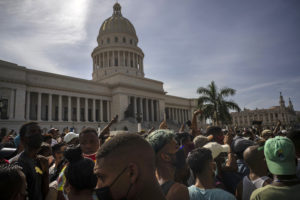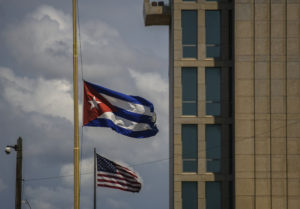On October 27, the Revolutionary Armed Forces of Colombia (Fuerzas Armadas Revolucionarias de Colombia, FARC) released Kevin Scott Sutay, a former U.S. army private that the guerrilla group had been holding hostage since June 2013. U.S. Secretary of State John Kerry immediately issued a statement welcoming Sutay’s release and expressing the U.S. government’s profound gratitude to the government of Colombia for “its tireless efforts to secure his release.” Kerry also thanked the Reverend Jesse Jackson, for contributing to Sutay’s release, and the International Committee of the Red Cross, which received the former captive and delivered him to U.S. government representatives.
The unusual thing about the U.S. statement is that it also thanks the governments of Norway and of Cuba for their involvement in the efforts to free Sutay. For those up-to-date on events in Colombia, thanking Cuba and Norway seems natural—after all, they are facilitating the Colombian government’s peace talks with the FARC. But for those who follow U.S. relations with Cuba, it’s a bit of a shock. The U.S. government, which keeps Cuba on a list of alleged State Sponsors of Terrorism, is thanking Cuba for its assistance in securing the release of a U.S. citizen.
The United States designated Cuba a State Sponsor of Terrorism in 1982. The list is meant to identify countries that have “repeatedly provided support for acts of international terrorism.” When Cuba was added to the list, it was actively supporting guerrilla groups throughout the western hemisphere. One can debate whether these were terrorist organizations, but there’s no question that they were seeking revolutionary change in Latin America and that the Reagan Administration didn’t like them. But in 1992, Fidel Castro announced the end of Cuba’s support for armed revolution.
Today, it is clear that Cuba is not supporting any insurgencies. Even the U.S. State Department supports this finding. The Department’s most recent Country Report on Terrorism bluntly states that in 2012, “There was no indication that the Cuban government provided weapons or paramilitary training to terrorist groups.” In fact, in recent years, Cuba has distanced itself from exiled Basque separatists living on the island; joined the Financial Action Task Force of South America, an intergovernmental group that blocks terrorist financing; and, of course, sponsored the peace talks between Colombia and the FARC.
In other words, Cuba is not a State Sponsor of Terrorism, and the State Department recognizes as much. However, it keeps the country on the terrorist list based not on Cuba’s current behavior but on its past support of the FARC—even though the FARC is currently in peace talks with Colombia. The U.S. government also justifies Cuba’s inclusion on the list based on the country’s harboring of Basque separatists—in spite of the fact that their presence in Cuba is the result of a 1984 agreement between the Spanish and Cuban governments—and the presence of a few U.S. fugitives. Harboring these individuals does not constitute promoting terrorism.
This is a problem because Cuba’s inclusion hurts the credibility of a list that should identify states that actually promote terrorism. Much more could be said about the negative consequences of Cuba’s inclusion on the list. But on a much more basic level, it is simply wrong. To recap: the U.S. State Department has admitted that Cuba no longer supports terrorism and armed insurgency; thanked Cuba for helping to secure the release of a U.S. citizen in Colombia; and lauded the Cuba-sponsored peace talks between Colombia and the FARC. All the while, it has continued to designate Cuba as a State Sponsor of Terrorism.
It is obvious that Cuba’s attitude toward revolutionary movements in the Americas has changed drastically since 1982. It’s time for U.S. policy to do the same and for Cuba to be removed from the list of State Sponsors of Terrorism. By doing so, perhaps our government could avoid another incident in which we thank our alleged enemies for helping us out.
Ana Goerdt is WOLA’s Program Officer for Cuba.
Photo by WOLA staff.


